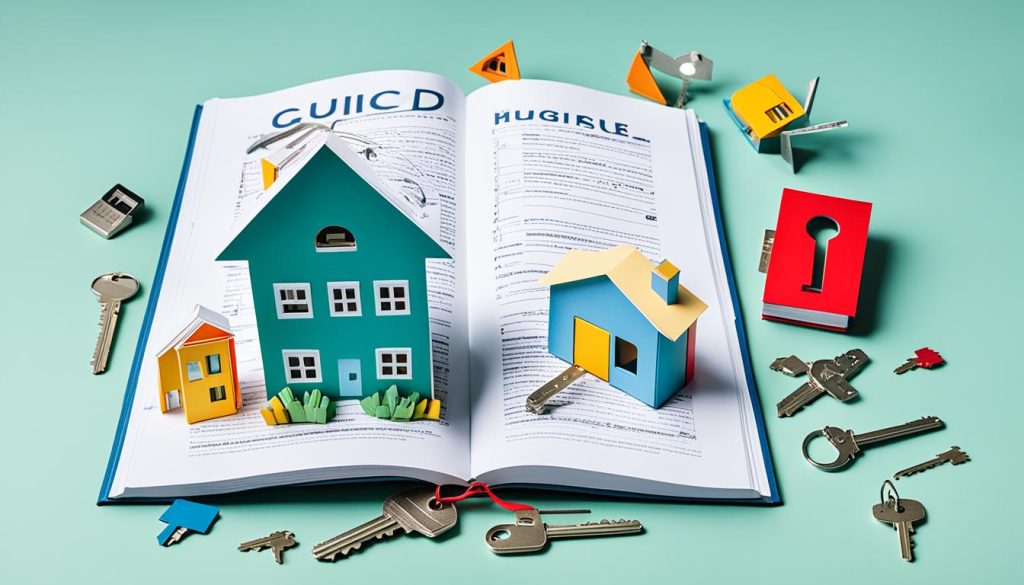Buying a home is a significant financial decision, and understanding mortgages is crucial. This comprehensive guide will provide you with the information you need to navigate the world of home financing options. You’ll learn about the different types of mortgage loans, down payment and closing cost considerations, as well as the steps involved in the home buying process. Whether you’re a first-time homebuyer or looking to refinance, this article will equip you with the knowledge to make an informed decision.
Key Takeaways
- Conventional loans were the most popular type of mortgage in Q4 20231
- FHA loans are available with a credit score as low as 580 and a 3.5 percent down payment1
- VA loans offered by the U.S. Department of Veterans Affairs allow eligible veterans and service members to obtain home loans without a down payment2
- Lenders require a down payment of 20% or more on conventional mortgages to avoid Private Mortgage Insurance (PMI)2
- First-time homebuyers can withdraw up to $10,000 from an IRA without paying a 10% early withdrawal penalty for the purchase of a home2
Understanding Mortgage Loans and Financing Options
Navigating the world of mortgage loans can be a daunting task, but understanding the different types of financing options available can help you make an informed decision. From traditional fixed-rate mortgages to government-backed loans, the mortgage landscape offers a diverse array of choices to suit your unique financial needs and goals.
Types of Mortgage Loans
Conventional loans are a popular choice, making up the majority of mortgage loans. These loans typically cost less than government-backed options, such as FHA loans, but may have stricter credit requirements3. FHA loans, on the other hand, cater to first-time homebuyers and those with lower credit scores, often requiring a smaller down payment3. VA loans, available to eligible military members, veterans, and their families, typically feature no down payment requirements3. Additionally, special programs offered by state or local housing agencies provide options for low- to middle-income borrowers, first-time homebuyers, or public service employees3.
When it comes to loan terms, shorter 15-year mortgages can save you money over the life of the loan due to lower interest costs, though they come with higher monthly payments compared to 30-year terms3. The interest rate type, whether fixed or adjustable, also plays a crucial role in determining the stability of your monthly payments and the total interest paid over the loan term3. Fixed-rate mortgages provide the comfort of consistent monthly payments, while adjustable-rate mortgages (ARMs) may offer lower initial rates but pose more risk with potential rate adjustments3.
Down Payment and Closing Cost Considerations
The amount of your down payment and the associated closing costs can significantly impact your monthly mortgage payments and overall financial situation. Conventional loans generally require a higher down payment, typically 20% or more, to avoid private mortgage insurance (PMI)4. However, government-backed loans like FHA and VA loans often allow for lower down payments, sometimes as little as 3.5% or even no down payment at all3. It’s important to note that closing costs, which can range from 2% to 6% of the loan amount, must also be factored into your home-buying budget4.
To make informed decisions, it’s crucial to research and compare the various mortgage options, considering factors such as interest rates, loan terms, down payment requirements, and closing costs5. Using online mortgage calculators can help you estimate your monthly payments and understand the long-term financial implications of your choices5.
Ultimately, the type of mortgage loan you choose will depend on your financial situation, goals, and the specific requirements of the property you’re interested in purchasing. By understanding the different mortgage loan types and their associated costs, you can make an informed decision that aligns with your homeownership aspirations354.
Qualifying for a Mortgage
Obtaining a mortgage is a significant financial decision, and lenders evaluate several key factors to assess your qualifications. Your credit score, debt-to-income ratio, and employment history are crucial elements that lenders consider when determining your mortgage eligibility6.
Credit Score Requirements
Lenders typically prefer borrowers with a credit score of at least 620 to qualify for most types of loans6. However, certain loan programs, such as FHA loans, may be accessible for borrowers with a credit score as low as 500 if they can provide a down payment of at least 10%6. Rocket Mortgage® offers FHA loans with a minimum credit score requirement of 580 points6. Additionally, government-backed VA Loans require a median FICO® Score of 580 or higher for qualified service members and veterans6.
Debt-to-Income Ratio Guidelines
Your debt-to-income (DTI) ratio is another crucial factor in the mortgage qualification process. Lenders typically prefer a DTI ratio of 50% or less, as this indicates your ability to manage your monthly debt payments6. Conventional loans generally have a DTI ratio requirement of no more than 36%, although some lenders may accept up to 50% with compensating factors7. FHA loans have a DTI ratio limit of 43%, while VA and USDA loans have a maximum DTI ratio of 41%7.
Lenders also consider alternative sources of income, such as military benefits, alimony, or commissions, in addition to your regular salary when assessing your financial situation6. Primary residences are generally considered less risky for lenders compared to secondary properties or investment properties, which can influence the qualification criteria for home loans6.

By understanding the credit score and debt-to-income ratio requirements, you can better prepare yourself for the mortgage qualification process and take steps to improve your financial standing if necessary678.
“Securing a mortgage is a crucial step in the home-buying journey, and understanding the qualification criteria can help you navigate the process with confidence.”
| Loan Type | Debt-to-Income (DTI) Ratio | Minimum Down Payment | Minimum Credit Score |
|---|---|---|---|
| Conventional Loan | No more than 36%, up to 50% with compensating factors | 3% | 620 |
| FHA Loan | No more than 43% | 3.5% | 580 |
| VA Loan | No more than 41% | 0% | 580 |
| USDA Loan | No more than 41% | 0% | Not specified |
Remember, the specific qualification requirements may vary depending on the lender and loan program. It’s essential to work closely with a trusted mortgage professional to understand your options and find the best fit for your financial situation786.
The Home Buying Process
Embarking on the home buying journey can be both exciting and overwhelming. The first crucial step is to get pre-approved for a mortgage. This involves submitting financial information to a lender, who will then provide you with a pre-approval letter outlining the loan amount and terms you qualify for9. Having this pre-approval letter in hand will demonstrate to real estate agents and sellers that you are a serious and qualified buyer, increasing your chances of securing the home of your dreams.
Working with a reputable real estate agent and lender can greatly streamline the home buying process. These professionals can provide valuable guidance and support throughout your journey, ensuring a smooth and successful transaction10. Real estate agents can assist you in identifying suitable properties, negotiating offers, and navigating the complex legal and administrative aspects of the home buying process. Lenders, on the other hand, can help you explore the various mortgage options available, from conventional loans to FHA, VA, and USDA loans, and guide you through the pre-approval and closing stages.
Getting Pre-Approved for a Mortgage
The mortgage pre-approval process involves providing your lender with a comprehensive overview of your financial situation, including income, assets, credit history, and debt obligations10. This information is used to determine the maximum loan amount you qualify for and the terms of the mortgage, such as the interest rate and monthly payments. Once you have your pre-approval letter in hand, you can confidently begin your home search, knowing that you have the financial backing to make a competitive offer.
Working with Real Estate Agents and Lenders
Collaborating with experienced real estate agents and lenders can be a game-changer in the home buying process. Real estate agents can provide valuable insights into the local market, assist in identifying properties that align with your preferences and budget, and guide you through the negotiation and closing stages11. Lenders, on the other hand, can help you navigate the complex world of mortgage financing, explore different loan options, and ensure a smooth and efficient lending process.
By working closely with these professionals, you can streamline the home buying journey, increase your chances of success, and make informed decisions that align with your financial goals911.
Mortgages: A Comprehensive Guide
Navigating the world of mortgages can be a daunting task, but with the right information, you can make informed decisions about your home financing. This comprehensive guide delves into the various mortgage12 types, financing options, and the home buying process to empower you throughout your journey12.
One of the essential aspects of understanding mortgages is exploring the different loan types available. The most common mortgage terms range from 10 to 30 years, with 30-year terms being the most popular12. Conventional loans, which make up approximately 75% of home loans, can be obtained with a minimum of 3% down payment and a 620 credit score requirement12. Additionally, VA loans for current and former military members have an upfront funding fee ranging from 1.25% to 3.3%12, while USDA loans for lower-income borrowers in rural areas require no down payment12.
Preparing for a mortgage involves understanding the qualifying factors, such as credit score, debt-to-income ratio, and down payment. Increasing your credit score before buying a home can lead to better mortgage rates and long-term cost savings12. Larger down payments can also result in lower interest rates from lenders due to lower perceived risk12. Additionally, mortgage discount points can be paid upfront to secure a lower interest rate12, and shorter loan terms typically come with lower interest rates, saving money on interest payments over the life of the loan12.
Understanding the home buying process is crucial for a successful mortgage experience. Getting pre-approved for a mortgage can give you a competitive edge in the housing market, while working with real estate agents and lenders can help you navigate the complexities of the process13. Currency exchange fluctuations and local banking relationships are essential considerations for those seeking mortgages abroad, as mortgage regulations vary globally13.
This comprehensive guide on mortgages provides you with the knowledge and resources to make informed decisions about your home financing. Whether you’re a first-time homebuyer or an experienced investor, this guide will equip you with the tools to navigate the mortgage landscape and achieve your homeownership goals.

Remember, the mortgage industry is constantly evolving, so it’s important to stay up-to-date with the latest trends and regulations. By utilizing this comprehensive guide and the resources provided, you can confidently embark on your mortgage journey and find the financing solution that best fits your needs121314.
Choosing the Right Mortgage Lender
Selecting the right mortgage lender is a crucial step in your home financing journey. When comparing lenders, there are several factors to consider that can significantly impact your overall experience and the cost of your mortgage15.
Factors to Consider When Selecting a Lender
First and foremost, evaluate the lender’s communication style and the level of customer service they provide. A lender who is responsive, transparent, and willing to guide you through the process can make a substantial difference in your overall satisfaction16.
Next, review the loan programs the lender offers. From fixed-rate mortgages and adjustable-rate mortgages to government-backed loans like FHA and VA, the range of options can significantly impact your ability to find the right fit for your financial situation16.
Interest rates and fees are also crucial factors to consider. Compare the rates and associated costs across multiple lenders to ensure you’re getting a competitive deal. Remember, even a small difference in rates can accumulate to substantial savings over the life of your mortgage16.
Understanding the lender’s loan process is also important. Ensure that the steps and timeline align with your needs and preferences. Some lenders may offer a more streamlined, digital-focused experience, while others may provide a more personalized, in-person approach1517.
Finally, consider the lender’s reputation and any special programs or discounts they may offer. For example, some lenders provide exclusive rates or fee waivers for existing customers or members of certain organizations16.

By carefully evaluating these factors, you can find a mortgage lender that will provide you with the best possible support throughout your home financing journey151617.
“Comparing offers from different lenders is crucial for finding competitive rates and terms.”
Conclusion
In conclusion, understanding the intricacies of mortgages and home financing is crucial for making informed decisions that can set you up for long-term financial success as a homeowner. This comprehensive guide has provided you with a detailed overview of the different mortgage loan options, the qualifications required, and the steps involved in the home buying process18.
By considering the factors to look for in a mortgage lender and utilizing the resources available, you can navigate the complexities of the mortgage market with confidence19. Today’s lending practices have evolved due to supply-demand dynamics in the housing market, making it essential to stay informed and explore all your options18.
Whether you’re a first-time homebuyer or a seasoned real estate investor, this guide has equipped you with the knowledge and tools necessary to make the best choices for your mortgage and home financing needs. By taking the time to understand the mortgage conclusion, home financing summary, and real estate financing tips, you can make the most of your homeownership journey20.
FAQ
What are the different types of mortgage loans?
Common types of mortgage loans include FHA loans, conventional loans, and VA loans. FHA loans typically require a lower down payment and have more lenient credit score requirements, while conventional loans generally require a higher down payment but may offer lower interest rates. VA loans are available to eligible military members, veterans, and their families, and often require no down payment.
How much of a down payment do I need for a mortgage?
The down payment amount can vary depending on the type of mortgage loan. FHA loans typically require a down payment of 3.5%, while conventional loans often require a down payment of 20% or more. The down payment amount, along with the closing costs, can significantly impact your monthly mortgage payments and overall financial situation.
What factors do lenders consider when qualifying me for a mortgage?
Lenders evaluate several key factors when qualifying you for a mortgage, including your credit score, debt-to-income ratio, employment history, and income. A higher credit score (generally above 620) and a lower debt-to-income ratio (typically 43% or less) can help you qualify for better interest rates and loan terms.
How do I get pre-approved for a mortgage?
To get pre-approved for a mortgage, you’ll need to submit financial information to a lender, who will then provide you with a pre-approval letter outlining the loan amount and terms you qualify for. Having this pre-approval letter can demonstrate to real estate agents and sellers that you are a serious and qualified buyer.
How can I find the right mortgage lender?
When selecting a mortgage lender, consider factors such as their communication style, the loan programs they offer, their interest rates and fees, and the overall customer service they provide. It’s also important to understand the lender’s loan process and ensure it aligns with your needs and preferences.
Source Links
- What Are The Major Types of Mortgage Loans? | Bankrate
- First-Time Homebuyer Loans, Special Programs, and How to Qualify
- Understand the different kinds of loans available | Consumer Financial Protection Bureau
- How Does a Mortgage Work? | | LendingTree
- What Is a Mortgage? Types, How They Work, and Examples
- Mortgage Qualification Tips: How To Qualify For A Mortgage
- Income Requirements To Qualify For A Mortgage | Bankrate
- How Much House Can I Afford? | Bankrate
- How To Buy a House: A Step-by-Step Guide
- How To Buy A House In 2024: Step-By-Step
- The Home Buying Process: What to Expect When Buying a Home
- Complete Guide to Mortgages: What Type of Home Loan Is Best for You?
- Mastering Mortgages: Your Ultimate Guide to Home Financing
- The Ascent’s Complete Guide to Mortgages | The Motley Fool
- 5 Tips To Choose A Mortgage Lender
- How To Choose a Mortgage Lender (2024 Guide)
- How To Choose A Mortgage Lender: 6 Tips | Bankrate
- Not Your Dad’s Note: How Have Mortgages Changed Over the Years?
- Mortgage Lending Discrimination
- Reverse Mortgage – The Good, The Bad, and The Conclusion

